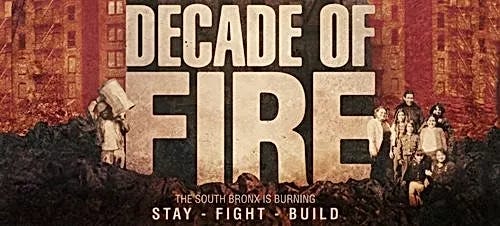In Progress…
Often the people who write and research urban public policy speak only in terms of laws, bills, proposals, and movements. They tend to ignore the long-term emotional and psychological impacts of these things on the people, both as collective neighborhoods and as individual citizens, on the communities they examine. Similarly, people who write about the urban experiences of their own personal memoirs or narratives of individuals and families often overlook the historical, economic, and political forces which cause, shape, and exacerbate their personal experiences. The documentary Decades of Fire, by Bronx-born Vivian Vázquez Irizarry, brilliantly avoids these myopic pitfalls by elegantly interweaving her personal narrative, along with those of her family and neighbors, with the larger institutional, economic, and historical forces that create and exacerbate urban poverty in America
Refreshingly, Irizarry, in her role as the film’s central character and co-director, offers a compelling blending of complex public policy explanations, a recounting of external economic, social, and political pressures, and an emotionally compelling personal narrative. This first-time director wonderfully personalizes the devastating effects of explicitly bigoted urban public policies in America over the last 50 years on individuals, families, and neighborhoods living in The Bronx. In so doing, the documentary brings alive the disruptive, dangerous, and often deadly reality for millions of American families in cities across the country. While The Bronx was an extreme example of the tragic and avoidable decline of American urban communities in the second half of the 20th Century, it was one among many cities that suffered from the interwoven policy effects of white supremacy, greed, and neglect.
Most of the documentary focuses on the post-World War II years through the 1970s and ’80s. It poignantly illustrates how the blame for the downward plight of The Bronx has wrongly been blamed on the perceived irresponsible individual actions of its residents. While we’ve ignored the impacts of explicitly racist public policies, myopic policymakers, corrupt political actors, and global economic forces upon the neighborhood and the lives of its residents. Through exploring the recollections of herself and other family members, Irizarry painfully shows the guilt and personal blame that most of the residents felt due to ill-informed and racially tinged media messaging about the causes of the neighborhood’s poverty, crime, and deterioration epitomized by the rampant arson initiated fires over the decades.
Irizarry also shows how, prior to destructive urban policies like ‘redlining’, ‘urban renewal, and urban core budget cuts, many problems like rampant crime, blight, and arson most notably associated with the South Bronx either did not exist or were substantially less of a problem in the community.
In the documentary, there is a subtle comparison between the urban renewal programs, which began in the post World War II period, and the contemporary urban gentrification occurring in traditionally poor, urban communities today all across the country.
While the documentary does a good job with its’ warranted criticism of more aggressive tactics of contemporary gentrification, the implication seems to be that the motives behind modern urban identifying forces are as explicitly malicious as those during the redlining days of the 20th century. Though I do agree that there are undoubtedly predatory real estate interests and financial institutions that still take advantage of the economic vulnerabilities of communities of color, I do not think that the motives can be characterized as the same or similar to those of urban renewal, since, oftentimes, urban renewal was done with the express purpose of destroying specific communities of color, while gentrification may destroy a community because of the lack of foresight and communication.
Official Site: www.decadeoffire.com
On Twitter: @decadeoffire
On Facebook: http://www.facebook.com/DecadeofFire
Director: Vivian Vázquez Irizarry & Gretchen Hildebran
Executive Producer: Sally Jo Fifer
Producer: Julia Steele Allen, Neyda Martinez
Consulting Producer: Yoruba Richen
Cinematographer: Eddie Martinez
Editor: Gretchen Hildebran, Sonia Gonzalez Martinez & Penelope Falk
Graphic Designer: David Tecson
Music: Arturo Ortiz
Running Time: 72 mins
Language: English, Spanish
Country: USA
Year: 2018
About the Author:
Michael Jackson is a writer & editor, based in NYC, focusing primarily on ways policy & politics can improve lives by interweaving personal narratives, public policy, & political science to shed light on the people & problems all too often marginalized & forgotten. Previously a Housing Narrative & Communications Fellow at Community Change & researcher at Demos, Michael holds a political science degree from Cal State East Bay & was a fellow at Columbia University Graduate School of Arts & Sciences’ Ph.D. program. You can follow him on Twitter or on Substack


